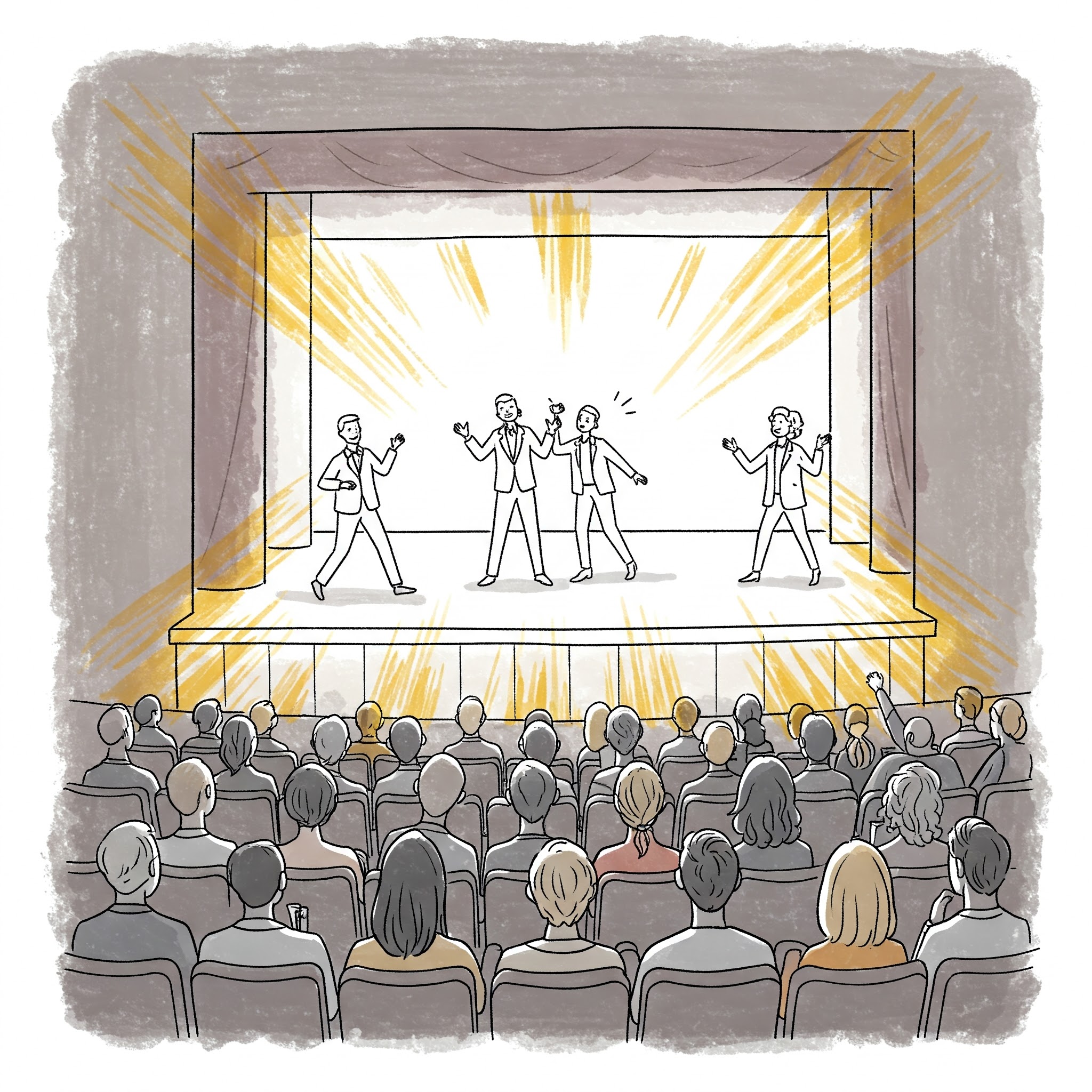Laughter
Definition
Laughter is a noun that refers to the physical and vocal reaction to humor, joy, or amusement. It involves rhythmic, audible sounds produced by the diaphragm and vocal cords, often accompanied by facial expressions and physical gestures.
Parts of Speech
- Noun
Pronunciation
American English
- IPA Pronunciation: /ˈlæf.tɚ/
- Respelling: LAF-ter
British English
- IPA Pronunciation: /ˈlɑːf.tə/
- Respelling: LARF-tuh
Etymology
The word "laughter" originates from Old English "hlaehter," derived from the Proto-Germanic "hlahtraz," meaning "to laugh." Its roots lie in the Proto-Indo-European "klek," which signifies a sharp sound or noise. The modern spelling and pronunciation developed in Middle English.
Derivatives
- Laugh (verb)
- Laughable (adjective)
- Laughingstock (noun)
- Laughterless (adjective)
- Laughingly (adverb)
Synonyms
- Chuckling
- Giggling
- Mirth
Antonyms
- Crying
- Weeping
- Sorrow
Usage
The term "laughter" is often used to describe expressions of happiness or amusement. For example, "The room was filled with laughter during the comedy show." It also conveys a sense of joy in literary and figurative contexts, such as "Her laughter was contagious."
Related Terms
- Humor: The quality of being amusing or entertaining.
- Joy: A feeling of great happiness.
- Amusement: The state of finding something funny or entertaining.
Detailed Definitions
Noun
- The act or sound of laughing: Refers to the audible expression of joy or amusement.
- Example: "The children’s laughter echoed through the park."
- An expression of humor or joy: Indicates a reaction to something funny or uplifting.
- Example: "Her laughter lightened the mood in the room."
- A state or feeling associated with happiness: Used metaphorically to represent joy.
- Example: "The play brought laughter and smiles to the audience."
laughter



🇨🇳 Mandarin (Simplified Chinese)
- 笑声 (xiàoshēng) - (laughter)
- IPA: /ɕi̯ɑʊ̯˨˩˦ ʂə́ŋ/
- Respelling: shi-ao-sheng
- 笑料 (xiàoliào) - (laughter, in the sense of something funny)
- IPA: /ɕi̯ɑʊ̯˨˩˦ lʲɑʊ̯˧˥/
- Respelling: shi-ao-lyao
🇮🇳 Hindi
- हंसी (haṅsī) - (laughter)
- IPA: /ɦə̃siː/
- Respelling: hun-see
- उपहास (upahās) - (laughter, in the sense of ridicule)
- IPA: /ʊphaːs/
- Respelling: up-haas
🇪🇸 Spanish
- Risa (risa) - (laughter)
- IPA: /ˈri.sa/
- Respelling: ree-sah
- Carcajada (carcajada) - (guffaw)
- IPA: /kar.kaˈxa.ða/
- Respelling: kar-ka-ha-da
🇫🇷 French
- Rire (rire) - (laughter)
- IPA: /ʁiʁ/
- Respelling: reer
- Rigolade (rigolade) - (laughter, in the sense of a good laugh or a joke)
- IPA: /ʁi.ɡɔ.lad/
- Respelling: ree-go-lad
🇦🇪 Modern Standard Arabic
- ضحك (ḍaḥk) - (laughter)
- IPA: /d̪ɑħk/
- Respelling: dahk
- قهقهة (qahqahah) - (loud laughter, guffaw)
- IPA: /qɑhqɑhɑh/
- Respelling: qah-qah-hah
🇧🇩 Bengali
- হাসি (hāsi) - (laughter)
- IPA: /ɦasi/
- Respelling: ha-see
- উপহাস (uphās) - (laughter, in the sense of ridicule)
- IPA: /upʰas/
- Respelling: up-haas
🇷🇺 Russian
- Смех (smekh) - (laughter)
- IPA: /smʲex/
- Respelling: smyehkh
- Хохот (khokhot) - (loud laughter, guffaw)
- IPA: /xɐˈxot/
- Respelling: kho-khot
🇵🇹 Portuguese
- Risada (risada) - (laughter)
- IPA: /ʁiˈsaðɐ/
- Respelling: ree-sa-dah
- Gargalhada (gargalhada) - (loud laughter, guffaw)
- IPA: /ɡɐɾɣɐˈʎaðɐ/
- Respelling: gar-ga-lyah-dah
🇮🇩 Indonesian
- Tawa (tawa) - (laughter)
- IPA: /ˈtawa/
- Respelling: ta-wa
- Gelak (gelak) - (loud laughter, guffaw)
- IPA: /ɡəˈlak/
- Respelling: ge-lak
🇩🇪 German
- Lachen (lachen) - (laughter)
- IPA: /ˈlaxn̩/
- Respelling: lakh-en
- Gelächter (gelächter) - (laughter, in the sense of a lot of people laughing)
- IPA: /ɡəˈlɛçtɐ/
- Respelling: ge-lekh-ter
🇯🇵 Japanese
- 笑い (warai) - (laughter)
- IPA: /ɰβaɾai/
- Respelling: wa-rai
- 大笑い (ōwarai) - (loud laughter, guffaw)
- IPA: /oːɰβaɾai/
- Respelling: o-wa-rai
🇻🇳 Vietnamese
- Tiếng cười (tiếng cười) - (laughter)
- IPA: /tjəŋ˧ kwiə˧˧/
- Respelling: tjeng kwie
- Cười to (cười to) - (loud laughter, guffaw)
- IPA: /kwiə˧˧ to˧/
- Respelling: kwie toh
🇰🇷 Korean
- 웃음 (useum) - (laughter)
- IPA: /ɯ.sʌm/
- Respelling: u-seum
- 큰웃음 (keunuseum) - (loud laughter, guffaw)
- IPA: /kʰɯ.nɯ.sʌm/
- Respelling: kheun-u-seum
🇹🇷 Turkish
- Kahkaha (kahkaha) - (laughter)
- IPA: /kahˈkaha/
- Respelling: kah-kah-ha
- Gülmek (gülmek) - (laughter, in the sense of the act of laughing)
- IPA: /ɟylˈmek/
- Respelling: gyul-mek
🇵🇰 Urdu
- ہنسی (hansī) - (laughter)
- IPA: /ɦənsiː/
- Respelling: hun-see
- قہقہہ (qahqahah) - (loud laughter, guffaw)
- IPA: /qəhqəhɑh/
- Respelling: qeh-qeh-hah





